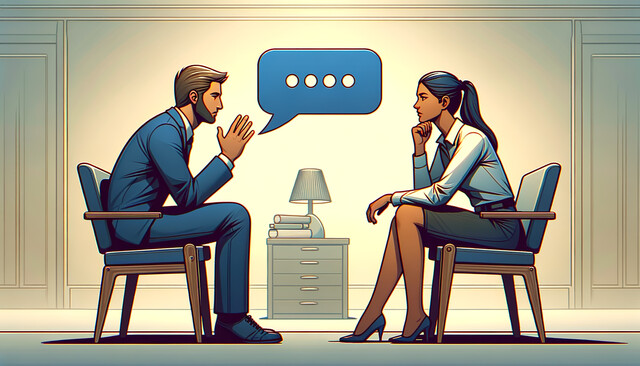Customer-Oriented Attitudes From Call Center Agents and CSRs
Your attitude goes a long way toward resolving an issue or making it worse. Keep in mind that most people don't complain without a reason. An angry customer doesn't start that way. They usually get angry if their questions are not resolved, if they're ignored, patronized, or if their questions or concerns are not addressed in a timely, efficient, and effective manner.
Call center agents should be aware of the reason why customers may be frustrated, difficult, or upset. For example, if you work in the retail industry, a customer may have received the wrong product, a damaged product, or product that doesn't meet their needs, after all.
In service-based industries, air-conditioning, plumbing, or television technicians, workmen, or other home-based services may have been inadequate, or completely failed to meet the needs of the customer or client.
In most cases, a customer grows angry because they have been:
- Ignored
- Spoken to rudely
- Treated with indifference
Regardless of why a customer grows irritated, frustrated, or angry, it takes confidence and skill to deal with them. First, the call center agent must strive to defuse their anger, so that they can get to the root of the problem. Keep in mind that angry customers are not necessarily angry at you, but at their situation.
One of the most difficult aspects of being a call center agent is to bite your tongue and remain calm in the face of an angry, cursing, or rude customer. When you have an angry customer at the other end of the line, they're not usually open to logical explanations right away, because of their high emotional state.
For example, a call center representative from a major airline received a call from a woman who demanded her money back because she missed her flight. The call center agent expressed empathy with the woman, who had missed the plane because her alarm didn't go off. The call center agent knew that it was the woman's responsibility to get to the airport on time, and that her missed flight was not at all the fault of the airline. What would you do in such a situation? Would you refund the woman her ticket price or not?
The question isn't as black and white as it seems. The airline certainly wants to keep the woman's loyalty, but then again, they're not in the business of losing money because someone didn't get to the airport in time to make their flight.
The call service agent told the woman that he could not refund the price of a ticket because her failure to arrive at the airport was through no fault of the airline. However, in order to try to appease the customer and encourage a re-booking, he spoke to his manager and was able to offer the woman a discount on a rescheduled flight.
The attitude portrayed by the call center agent was customer-oriented. Remember that the goal of providing service to clients and customers is to keep them happy and coming back. The importance of customer relationships is often balanced against loss of revenue provided by returns, refunds, or coupons, discounts, or other incentives in an attempt to keep customers happy.
Let's be honest. If you weren't a call center agent and you heard the story of the woman who missed the flight because her alarm clock didn't work, we'd most likely think, "Well, it was her fault she didn't make her flight. Why should the airline pay for it?"
However, a customer-oriented attitude from a call center agent deals with such issues on a daily basis. We talked about the importance of empowerment - giving call center agents and customer service representatives the power and authority to make compromises in order to keep customers happy and coming back. That offers value in customer-centric service.
Your approach to customer service will be based on the customer. Customers have different personalities, needs, behaviors, and attitudes. As a call center agent, it's important to understand customer personalities. We'll describe four of them in this lesson.
Driver - The driver personality likes to be in control of the situation. They like to do things their way, and appreciate value. A driver is a personality that takes action or maintains focus on specific tasks and objectives. They're practical and decisive. This type of customer won't hesitate to tell you what they want, and they don't want to hear excuses or reasons why you can't give it to them. When you tell them you're going to do something, they will expect you to do so immediately.
Analytical - The analytical customer displays character traits that include organization, careful thought and deliberation, and is detail-oriented. Analytical customers want information and they want it delivered in a logical way. This type of customer may ask numerous questions to make sure they understand their choices before making decisions. When working with such customers, the call center agent should be prepared to offer facts, data, or information in a step-by-step approach in order to address the caller's issues.
Expressive - The expressive customer is what you might consider a social butterfly. They're extroverted, emotional, and like to talk. Such customers can be extremely dramatic and manipulative. Most often, this personality type is as interested in details as the end result. They may be disorganized, which will require a call center agent to explain the situation or options more than once.
Amiable - The amiable personality falls between the analytical and expressive personality. This type of personality wants to have their problem or issue resolved without disagreement or argument. Amiable customers tend to be emotional and sometimes relatively easy-going. However, they do expect honesty and sincerity from you, and may be suspicious or wary of being taken advantage of.
As a call center agent, or in-person customer service representative, know and understand as quickly as possible what type of customer personality you're dealing with. This will help you adapt your approach to customer service for that individual.
Again, your approach to resolving a customer complaint will depend on why the customer has complained in the first place. Regardless, you realize that one unhappy or dissatisfied customer or client can have a very detrimental effect on the success of any company or business. Of course, no one is perfect, and customer complaints can be a very real challenge for call center agents to deal with. Some things are beyond the control of a call center agent or customer service representative, regardless of industry.
One of the most proactive and productive solutions to resolving a customer complaint is for the call center agent or CSR to ask the customer how they would like the problem to be resolved. The important thing is to be proactive and empowered to offer solutions for a customer's complaint or dissatisfaction that will protect and sometimes enhance the reputation of the business or company.
Interestingly, a survey regarding such issues determined that customers don't necessarily want to be compensated or given something free in order to "make up" for the issue. What do they want? An overwhelming number of respondents stated that they want to know why the problem or issue occurred. They want to be assured that the issue won't happen again. Some want an apology, and others just want a chance to express their frustration or disappointment regarding the product or service.
Conclusion
You may not satisfy every customer's complaint, but you can take steps to promote a positive relationship with each and every one of your customers. Be knowledgeable about your products and services. Provide flexible services, fast response time and -- most important of all -- a positive personality when it comes to dealing with customer complaints.
Understanding your customers goes beyond knowing what type of personality they have. Dealing with diversity, the generation gap, and different cultures may also have a large impact on how you approach customer service.
Dealing With Diversity
Understanding generational and cultural differences between customers helps call center agents deal with different attitudes and expectations, based on their culture. Dealing with the generation gap may help you focus on how different customers view customer service, based on their age. Being aware of a customer's culture and general age goes a long way toward providing excellent telephone service and customer-oriented solutions for your clients.
Different Cultures, Expectations, and Attitudes
Not everyone feels the same about anything. Different people have different expectations from the products or services they've purchased. Likewise, their attitudes about such services may also differ, depending on their culture. Cultural values and the way you communicate with such individuals is an important part of your job.
The diversity of clients or customers you deal with on a daily basis depends, of course, on your geographical location. Different backgrounds, styles of communication, and factors such as gender, language, and race also play a large role in approaches to customer service that embrace both ethnic and cultural diversity.
Perhaps the best way to describe such diversity from your perspective as a call center agent is to remember that if you feel someone is different than you, then naturally, you're also different from them. It's important for you to understand and accept cultural diversity when dealing with customers.
As a call center agent, you'll likely deal with a variety of individuals of Hispanic, Asian, African American, Middle Eastern, or Pacific Island decent and background. If you work for a large company, you may deal with individuals from around the world. For example, your caller may be Hispanic, but do you know whether he or she is Mexican, Puerto Rican, or Guatemalan? The fact is, you don't know whether that individual is a new immigrant to the country or a third generation citizen. Resist the urge to clump people into categories when speaking to them over the phone, or in person.
Your ability to deal with a Japanese customer and a caller from India may require you to take a totally different approach to each one. The same goes for age. The method of communication you use to resolve a complaint or issue from a thirty-something-year-old may not be as effective when using that same approach for someone who is 65 years old.
As a call center agent, you'll interact with individuals from diverse cultural backgrounds on a daily basis. Of course, you can't be expected to know the depths of every culture, but every customer you talk to, regardless of background, race or age, should be treated with courtesy and professionalism. Each and every customer deserves informed and knowledgeable services.
You may experience difficulty communicating with some individuals, depending on language skills, knowledge, and vocabulary. In many cultures, formality is essential, while with others, you can be more informal. Following are a few tips on dealing with a variety of different cultures:
- Pay attention and respond to what the customer is saying, and not how it is said. Just because a customer may not have the greatest language skills doesn't mean they are not smart, informed, or aware of what a product or service should or should not do.
- Start the conversation in a more formal manner. Many cultures around the world respect and respond to formality.
- If you're not sure what the person has said, or don't understand their name or title, be polite and ask them to repeat it. Apologize and say that you did not understand what they said. In turn, you must speak to them slowly and clearly.
- Never stereotype. Stereotyping behaviors often lead to misunderstanding and severely interfere with, and even hinder, a positive customer service encounter.
Dealing With the Generation Gap
Whether you're a call center agent working in a group setting, a home-based telephone service, or a physical customer service representative, it's important to understand that generational differences often affect expectations of the customer in regard to customer service.
Every generation is deeply affected and influenced by generational core values. For example, a 65-year-old may rely on more "old-fashioned" approaches to customer service than a twenty-something of today, who is experienced and adept at online chats, negotiations, and resolutions.
As a call center agent, become familiar with generational differences. For example, during your daily shift, you're likely to deal with:
- Matures - These are people born before 1946. They grew up during the Depression and experienced the second world war. This generation has a strong work ethic and expects everyone else to feel the same way. This generation grew up in lean times and wastes nothing. They plan for a "rainy day" and tend to be conservative spenders.
- Baby Boomers - Baby boomers were born between 1946 and 1964. The baby boomer generation also worked hard, but was able to take advantage of more conveniences and products developed between the 1940s and the 1970s. The baby boomer generation is also known as the first "credit card" generation. The baby boomer and mature generation prefer in-person contact and communication, and often find it frustrating to try to resolve issues on the phone or over the Internet.
- Generation X - This generation is classified as those born between 1965 and 1980. This generation is perhaps the most diverse to date. Most of this generation went to college and have white-collar jobs. Many of them come from the first generation of two-income families. Individuals from this generation are considered self-sufficient and independent. They often prefer a "hands-off" philosophy to life, meaning that they like to do things their own way and may not understand or agree with corporate or management policies and guidelines.
- The Millennial Generation - This generation is also known as Generation Y and consists of those born after 1980. They've grown up in an age of computers and high-tech development. They know how to use and take advantage of cell phones, laptops, and their Blackberries, Smartphones and iPads. They're literally "plugged in" 24/7. This generation prefers not to engage in physical or face-to-face communication with customer service representatives, but much prefer text messaging, email, and chat lines when it comes to customer complaints. This generation focuses on "immediacy" in every aspect of their environment. This generation has a relatively short attention span, and because of their high-tech usage of Internet technology, expect things to occur very quickly. Bottom line - they don't like to wait for anything.
As you can see, dealing with the generation gap can be challenging to a call center agent or a customer service representative, especially if you work for a multi-global corporation or as a home-based CSR. Serving different generations requires understanding how to approach each of these generations in regard to expectations.
Conclusion
Each generation has its own attitudes regarding customer service, negotiations, and service relationships. Older generations expect excellent customer service every day, and are vocal when it comes to negotiating or resolving a customer service issue or relationship. On the other hand, younger generations prefer telephone or online communication, and understand how such systems work.
As a call center agent, whether you're home-based or not, it's important for you to understand the special needs and expectations of each customer in regard to culture, age, and race. We encourage students to continue to explore different cultures, expectations, attitudes, and generational issues to offer the best in services that meet the needs of each diverse group of individuals.






























